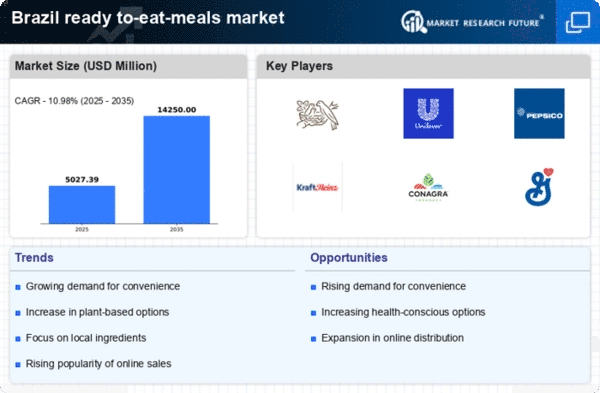The Brazil Ready to Eat Meals Market is characterized by a fast-evolving landscape that reflects changing consumer preferences, technological advancements, and the growing demand for convenient food solutions. The competitive dynamics in this market highlight a multitude of players vying for market share, each bringing distinct offerings and strategies to appeal to a diverse consumer base. With a notable increase in busy lifestyles and an urban population that seeks quick meal options without compromising on nutrition or taste, companies in this space are innovating to meet these demands.
The competition ranges from established multinational corporations to emerging local brands, each adapting its strategies to cater to the preferences of Brazilian consumers, particularly in urban areas. General Mills, a notable player in Brazil's Ready to Eat Meals Market, possesses a strong presence substantiated by its commitment to quality and innovation. The company has successfully leveraged its global expertise to introduce products tailored to the local palate, addressing the unique flavors and dietary preferences prevalent in Brazilian culture.
General Mills emphasizes the use of high-quality ingredients and the health benefits of its offerings, which resonate with a consumer base increasingly focused on wellness and nutritious eating.
The company has built a reputation for reliability and variety, securing a loyal customer base. Furthermore, General Mills is continuously investing in marketing and distribution strategies to enhance brand visibility, allowing for an effective capture of market opportunities in Brazil.Panda, another significant contender in the Brazil Ready to Eat Meals Market, is recognized for its dynamic product range and commitment to local tastes. The company has established its market presence through a diverse portfolio that includes ready-to-eat meals inspired by various culinary traditions.
Panda’s strengths lie in its ability to innovate quickly and respond to consumer trends, offering meals that are not only convenient but also rich in flavor. The company has focused on building partnerships for distribution, enhancing its reach across various retail channels in Brazil. Additionally, Panda's growth strategy includes strategic mergers and acquisitions that augment its capabilities and expand its service offerings, positioning it as a competitive force in the market. With its focus on quality, authenticity, and adaptability, Panda continues to capture attention among consumers looking for satisfying meal solutions that are quick and hassle-free.














